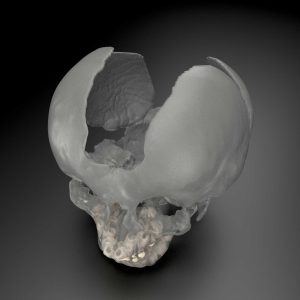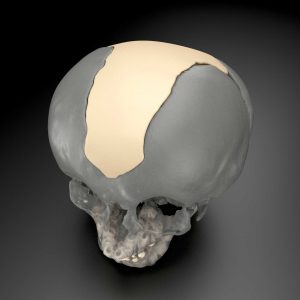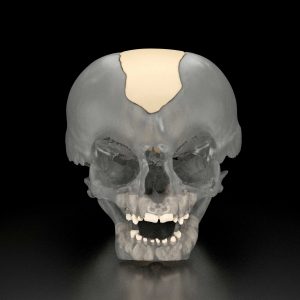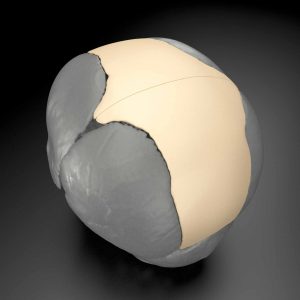A unique Custom Surgical Solution involved a syndromic patient requiring a two-piece PEEK implant and 3D anatomical models. In this case, patient growth expanded the frontal and parietal bones, widening the frontal and sagittal sutures. By surgeon recommendation, a patient-specific PEEK implant was elected to fill the void and protect the patient’s brain.
The surgeon reached out to their AccuShape® representative to request a custom PEEK implant. After a quick CT upload and service request, MedCAD designed a patient-matched implant and sent 3D-printed stereolithic models of the skull and implant for the surgeon to review. As our representative reported, “The surgeon could visualize how the implant and skull were going to line up, and used the models to educate the patient’s family about the procedure.”
AccuModel® Anatomical Models are 3D-printed models providing 3D replications of patient-specific CT data. The surgeon in this case considered the cranioplasty a standard operation and valued the ability to study the neuro medical model with a clear view of simulated patient anatomy.
Once the 3D models were reviewed by the surgeon, they communicated design approval to MedCAD and received the PEEK implant within 6 business days. Most cases are delivered within 4-5 business days with expediting options promising delivery in as few as 24 hours, depending on the surgery date. Our AccuShape Representative continued in saying:
“The surgery went awesomely. Implant was easy to fixate in two parts, and it was a quick surgery. One of the attending physicians typically uses porous polyethylene, but he saw the advantages of AccuShape’s thinner design, tapered edge, and PEEK material. By the end of surgery, there were at least 5 comments on how great it looked.”
When asked what set PEEK apart from porous polyethylene, our representative recalled, “Through conversation with the surgeon, I was able to communicate the bioinert characteristics of PEEK, similarities to cortical bone, customizability, and how well it works with titanium screws.”
The material nature of PEEK implants could potentially be a valuable aspect of an implant revision strategy for these types of cases. PEEK does not osseointegrate, so if revision is needed it can be easily explanted. The priority in the short term, though, was finding a strong implant with a good fit for this patient.
The model kit provided by MedCAD prepared the surgical team to better approach the cranioplasty procedure. Physically interacting with the AccuModel 3D anatomical models contributed to surgery preparation efforts and patient family education. The custom surgical solution for this patient reportedly went well with successful cranioplasty implantation.

Syndromic skull model

Syndromic skull model with PEEK cranial implant, anterior perspective

Syndromic skull model with PEEK cranial implant, anterior

Syndromic skull model with PEEK cranial implant, posterior perspective
Interested in becoming an AccuShape Representative? Visit our representative page to learn more.

